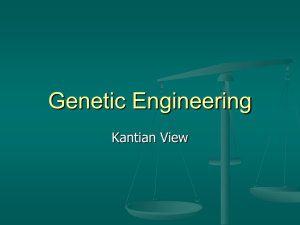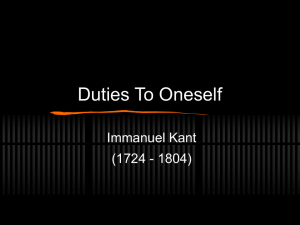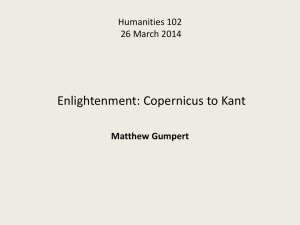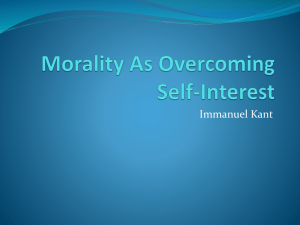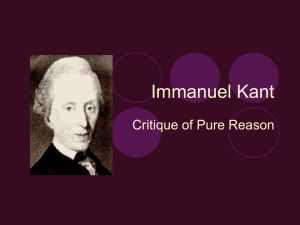733A40: History of International Relations 2012/09/15 Group 4 Egill
advertisement
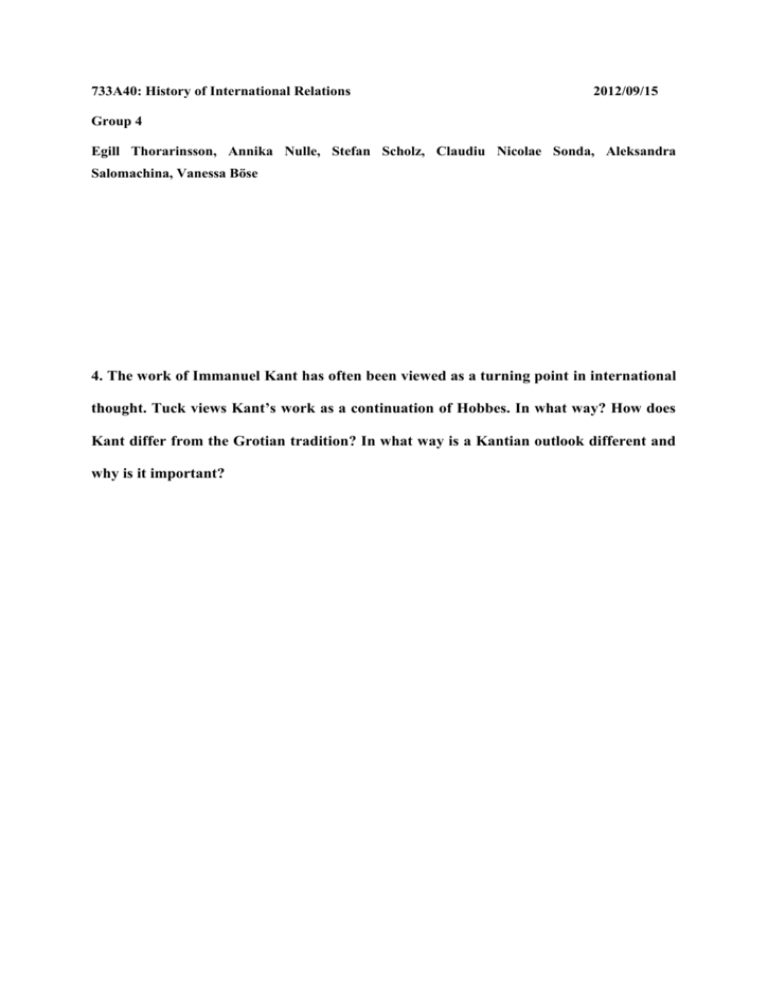
733A40: History of International Relations 2012/09/15 Group 4 Egill Thorarinsson, Annika Nulle, Stefan Scholz, Claudiu Nicolae Sonda, Aleksandra Salomachina, Vanessa Böse 4. The work of Immanuel Kant has often been viewed as a turning point in international thought. Tuck views Kant’s work as a continuation of Hobbes. In what way? How does Kant differ from the Grotian tradition? In what way is a Kantian outlook different and why is it important? 1. Introduction: Traditional view of Kant The conventional perspective of Immanuel Kant’s work has often been viewed as a turning point in international thought. Compared with other authors at his time Kant is regarded as the one who came up with new ideas which changed international thought. His idea of cosmopolitan rights was regarded as being in front of his time. Cosmopolitanism is based on the idea that all humans belong to one community with a shared morality. This shared morality can lead to a cosmopolitan community. 2. Tuck’s view of Kant In our opinion Richard Tuck contradicts the conventional literature. He sees Kant putting forward the ideas which were extremely close to Hobbes. State of Nature Kant agrees to Hobbes’s idea of the state of nature and supports the need to leave the state of war and enter civil society. Kant stated that before a lawful condition is established no one can be secure against violence from another. Therefore men have the moral duty to enter civil society. Another common idea for Kant and Hobbes is the view on sovereignty. Kant has a republican view on this, while Hobbes is a monarchist. However, Kant’s theory is very close to Hobbes’ one. According to Kant, the legislative sovereign is the entire body of the people agreeing unanimously on decisions. This means it has to be represented by a figure, a supreme legislator. Also, the same as Hobbes, Kant considers the sovereign to be legitimate and should be thought of as the outcome of a general will (Tuck, 1999, p. 211). Despite Hobbes, Kant says that all the laws which are released by the sovereign can be seen as unjust and can therefore be discussed by the citizens without the necessity to leave the state (Tuck 1999, p. 211f.). Right of Nations Kant agrees to Hobbes’s view on the state of nature as a state of war and considers the rights within this kind of state to be only provisional. The difference with Hobbes is that the latter sees rights as provisional in whatever state of nature there might exist (Tuck, 1999, p. 215). Considering the rights as provisional, the right to pre-emptive strike is for Kant legitimate in the state of nature, even if there is no act of aggression from another state. The increase in power of a state is enough to be considered a threat to another lesser power, and this legitimizes a strike from the lesser power (Tuck, 1999, p.215). Kant is very Hobbesian also with regard to the right of acquisition. According to their common beliefs, a land is legitimately part of a state to the extent that the state has effective control over it. Furthermore, developing the land is not a prerequisite of legitimate occupation. It is only a sign of it (Tuck, 1999, p.316). 2 Kant’s originality from Hobbes resides in the fact that Kant considers the discussion on preemptive strike and acquisition only in the context of the state of nature. The difference to Kant is that Hobbes sees pre-emptive strikes to be always legitimate. For Kant this state is only a stage in the process that will finally lead to civil society, a society of nations (Tuck, 1999, p. 217). However, the delay of the appearance of the system where rights are cosmopolitan is not tragical to Kant. On the contrary, he sees warfare as beneficial to culture and considers military antagonism to be a necessity for the purpose of international cooperation (Tuck, 1999, p. 218). 3. Difference Grotius/Kant Colonization Concerning colonization Kant and Grotius represent different point of views. Grotius argues that “…one can have true, private property only in things which one can either personally consume or personally transform in some way.” (Tuck, 1999, p. 90). Keeping in mind that Grotius was employed by the state of Holland and his task was to justify the Dutch politics it becomes clear that Grotius approved colonization. In opposition to Grotius justification of colonization Kant claims that the way Europeans acquired the lands of American Indians and other inhabitants is to be repudiated. Right of War Kant rejected the idea that in nature there could be such a thing as a punitive war on the grounds that punishment occurs only in the relation of a superior to those subjects to him. Instead he supported the idea of defensive war. According to Grotius both individuals and states may use violence in the same way. He explains this with the assimilation of individuals and states. Every individual has the right of punishment which they transfer to the sovereign through their collective agreement. Grotius argues that “Kings, and those who are invested with a Power equal to that of Kings, have a Right to exact Punishments, not only for Injuries committed against themselves, or their Subjects, but likewise, for those which do not peculiarly concern them” (Tuck, 1999, p. 102 f.). Therefore, Grotius outlook is more far reaching than Kant’s. He endorses for an expanded set of rights to make war. Sea and land Grotius states that the sea cannot come under the control of a state, because “one can have true, private property only in things which one can either personally consume or transform in some way” (Tuck, 1999, p. 90). Consequently, the sea belongs to everyone. Contradicting Grotius, Kant argues that possession of sea is possible for ‘neighboring waters’. He says “as far as a cannon shot can reach no one may fish…” (Tuck, 1999, p. 216). 3




